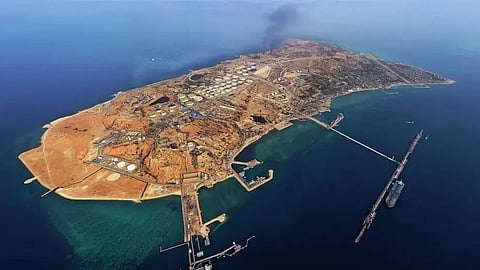

Iran's economy is at risk of simultaneous hyperinflation and severe recession, officials and analysts say, as clerical rulers scramble to preserve stability with limited room to manoeuvre after a snapback of UN sanctions.
They followed a breakdown in talks to curb Iran's disputed nuclear activity and its ballistic missile programme. Diplomacy to resolve the deadlock remains possible, both sides say, though Iranian Supreme Leader Ayatollah Ali Khamenei has rebuffed US President Donald Trump's offer to forge a new deal.
Three senior Iranian officials, speaking on condition of anonymity, said Tehran believes the US, its Western allies and Israel are intensifying sanctions to “fuel unrest” in Iran and jeopardise the very existence of the Islamic Republic.
Since the reimposition of UN sanctions on September 28, multiple high-level meetings have been held in Tehran on how to avert economic collapse, circumvent sanctions and manage simmering public anger, the officials told Reuters.
Deepening economic disparities between ordinary Iranians and a privileged clerical and security elite, economic mismanagement, galloping inflation and state corruption — reported even by state media — have fanned discontent.
"The establishment knows protests are inevitable, it is only a matter of time...The problem is growing, while our options are shrinking," said one of the officials.
Iran's leadership is leaning heavily on its "resistance economy" — a strategy of self-sufficiency and closer trade with China, Russia and some regional states. Moscow and Beijing back Iran’s right to peaceful nuclear energy and condemned US and Israeli strikes on three Iranian nuclear sites in June.
But analysts warn that such workarounds may not be enough to shield the sprawling country of 92 million people from the renewed economic blow.
"The impact of the UN sanctions will be severe and multifaceted, deepening the country’s longstanding structural and financial vulnerabilities,” said Umud Shokri, an energy strategist and senior visiting fellow at George Mason University near Washington.
"The government is struggling to maintain economic stability as sanctions disrupt banking networks, restrict trade and constrain oil exports — the country’s main revenue source, resulting in escalating social and economic pressure."
Iran has avoided wholesale economic meltdown since 2018 when, during his first term, Trump withdrew the US from Tehran’s 2015 nuclear deal with six world powers and reimposed US sanctions.
But the revival of wider UN sanctions is inflicting shocks that will stymie economic growth, accelerate inflation and the collapse of the rial currency, pushing the economy toward a recessionary spiral, one of the Iranian officials said.
Iran’s economy contracted sharply after 2018 due to renewed US sanctions. It rebounded in 2020 to grow modestly at times, largely due to oil trade with China.
But the World Bank this month forecast a shrinkage of 1.7 per cent in 2025 and 2.8 per cent in 2026 — sharply down from the 0.7 per cent growth it had projected in April for next year.
While Tehran still relies heavily on oil exports to China — its biggest customer and one of the few countries still doing business with it despite Trump's "maximum pressure" policy, doubts reign over the sustainability of that trade.
Although sold at a discount, crude remains a vital source of income for Tehran, with oil and petrochemicals making up about a quarter of GDP in 2024.
Despite public assurances that oil sales to China will continue, one Iranian official said the reimposed global sanctions could stifle that flow.
Shokri said that if China seeks to ease tensions with the Trump administration, it may tighten its stance on Iranian oil — demanding steeper discounts or cutting imports altogether.
For Tehran, the costs could be devastating. Every dollar shaved off the price of oil translates into roughly half a billion dollars in lost annual revenue, he said.
The rial has shrivelled to 1,115,000 per dollar from 920,000 in August, stoking inflation to at least 40 per cent and gutting purchasing power. Persistent currency depreciation and trade sanctions are driving up prices and sapping investor confidence.
Few Iranians can escape the attendant hardships. A sense of desperation is rippling through society, affecting urban professionals, bazaar traders and rural farmers alike.
"How much more pressure are we supposed to endure? Until when? I’m a government employee, and I earn just 34 million tomans (around $300) a month," said Alireza, 43, speaking by phone from the capital Tehran. Like others, he asked not to be further identified for fear of retribution from authorities.
"My wife is jobless. The import-export company she worked for shut down last month. With just my salary and two kids, we’re struggling to even pay rent and school expenses. What are we supposed to do?”
Iran’s official inflation rate is around 40 per cent though some estimates exceed 50 per cent. Official data in September showed prices for ten staple goods — including meat, rice and chicken — rose 51 per cent in one year. Housing and utility costs have also surged. Beef now costs $12 a kilo — too expensive for many families.
The clerical elite increasingly worry that mounting public distress could reignite mass protests that have erupted periodically since 2017 among lower- and middle-income Iranians, the second Iranian official said.
Many Iranians like Sima, 32, a factory worker in the central city of Shiraz worn down by years of economic strain, worry that the expanded sanctions will push them past the breaking point.
"Now they say we’re facing new sanctions again, but we’re already struggling to provide for our three children. Prices go up every single day and we can’t even afford to buy meat for them once a month,” said Sima.
Many business owners fear deeper international isolation and further Israeli airstrikes if diplomacy fails to resolve the nuclear standoff.
"With the constant fear of a possible attack and not knowing whether I’ll even be able to export this month or next, how am I supposed to keep my business running?” said Mehdi, who ships fruit to neighbouring countries.
(Writing by Parisa Hafezi; editing by Mark Heinrich)
